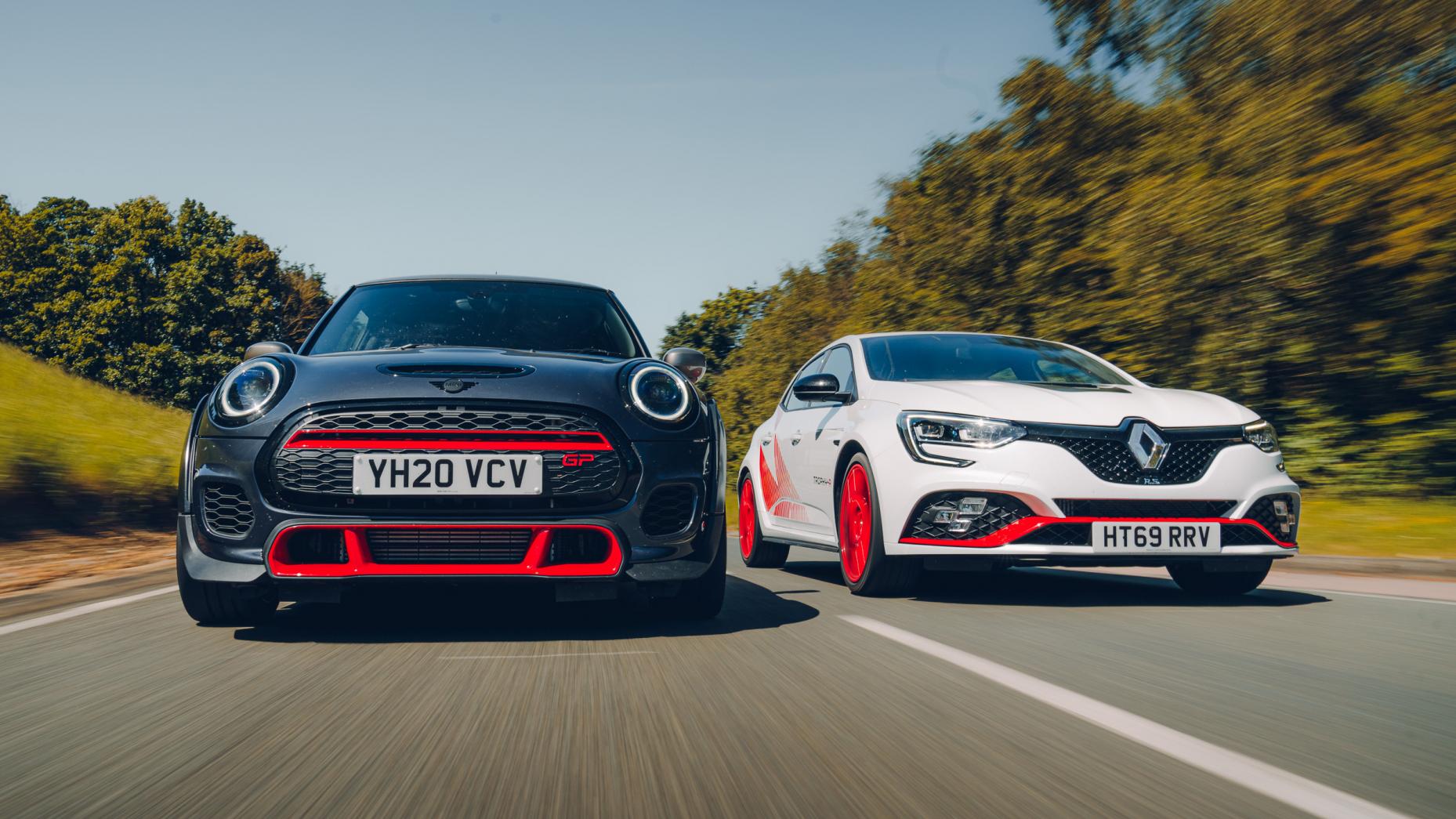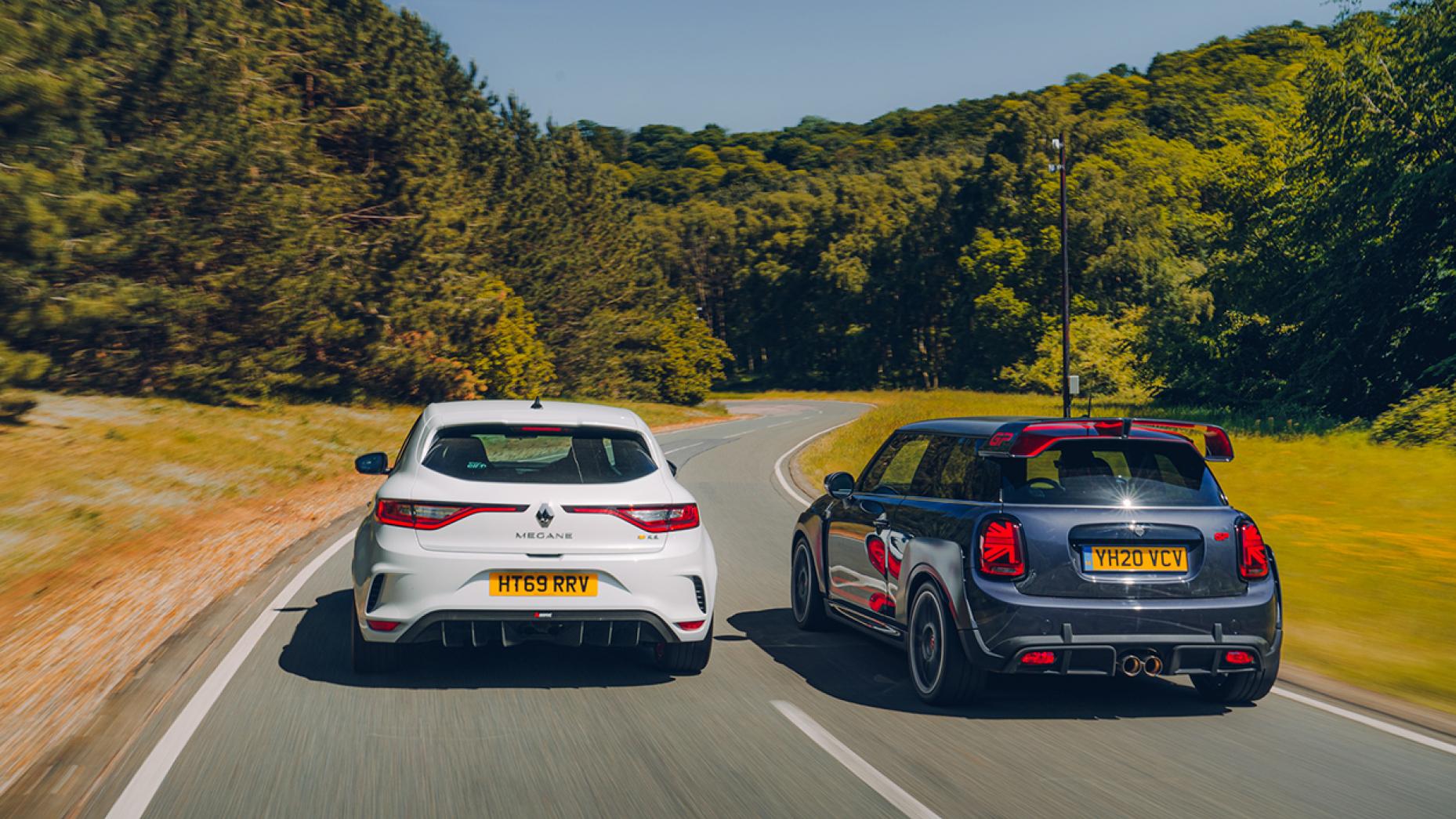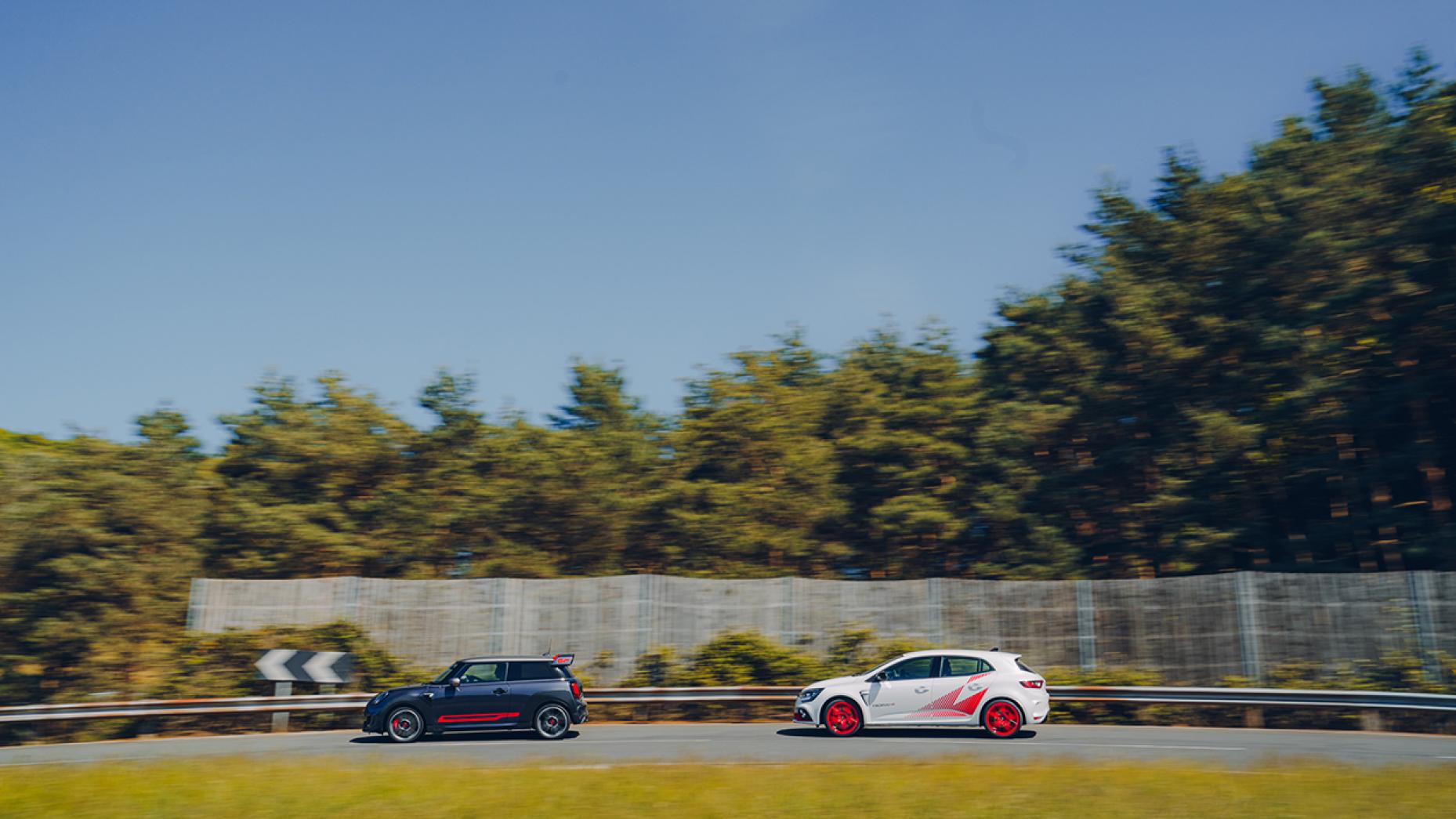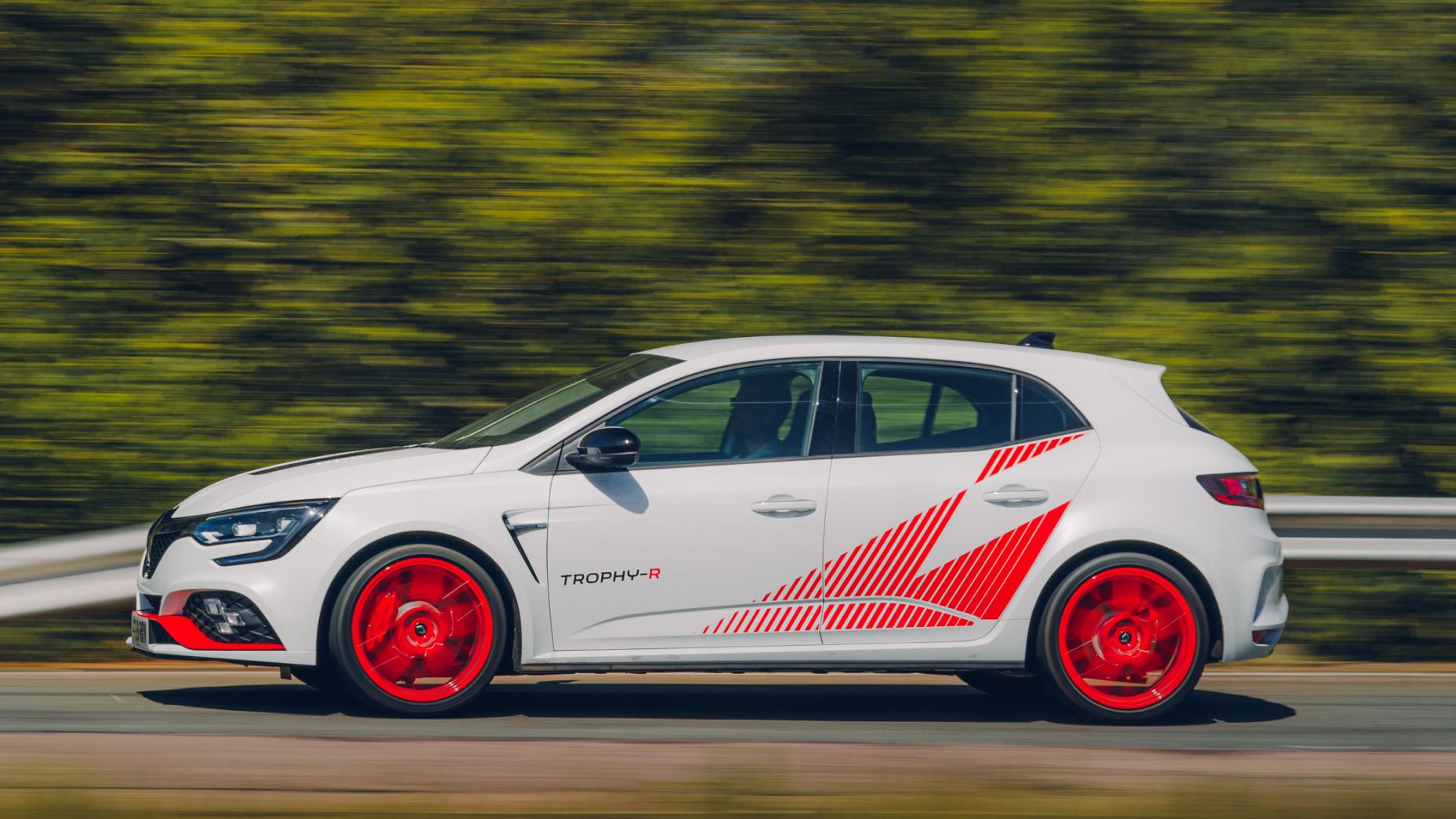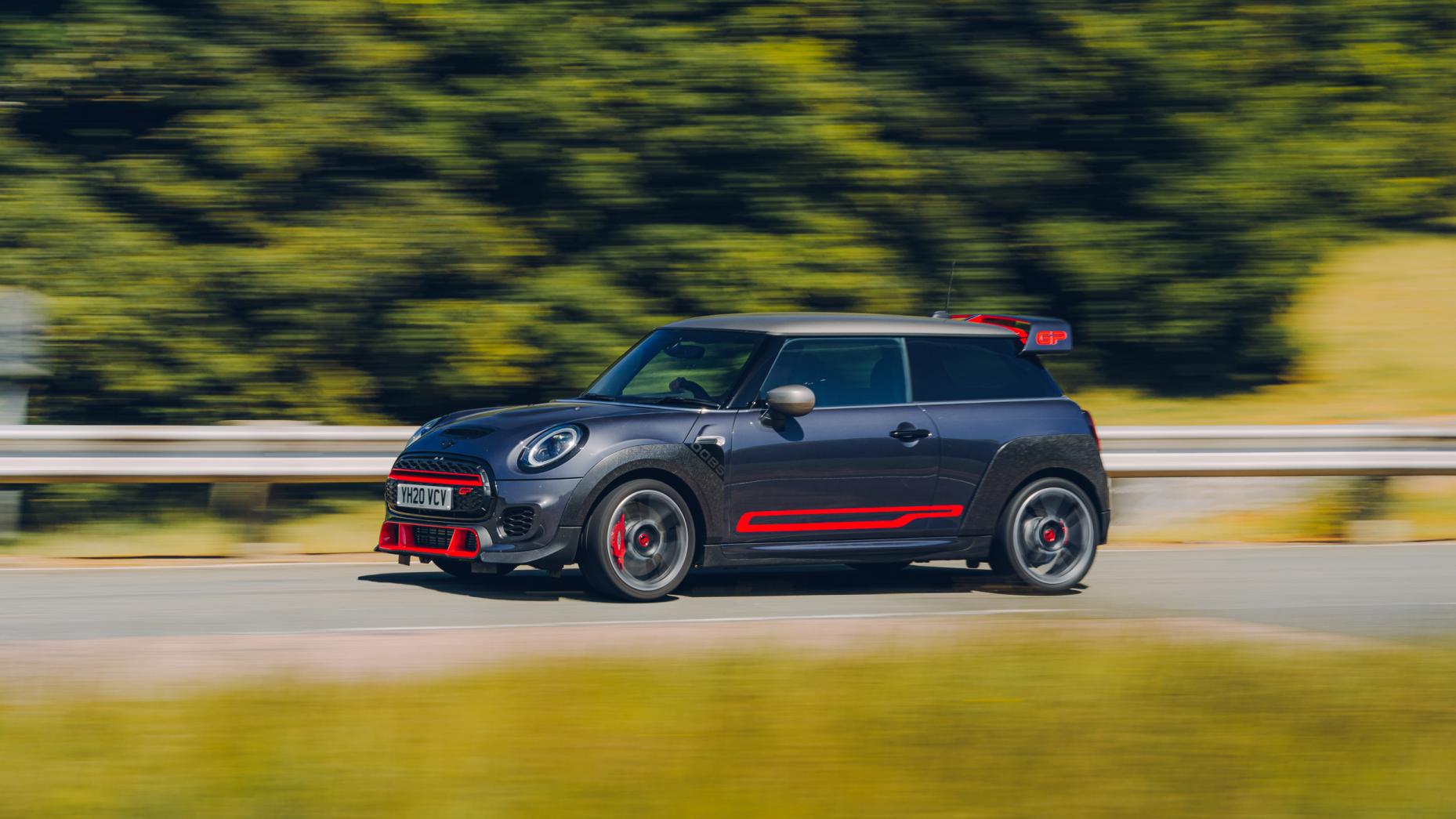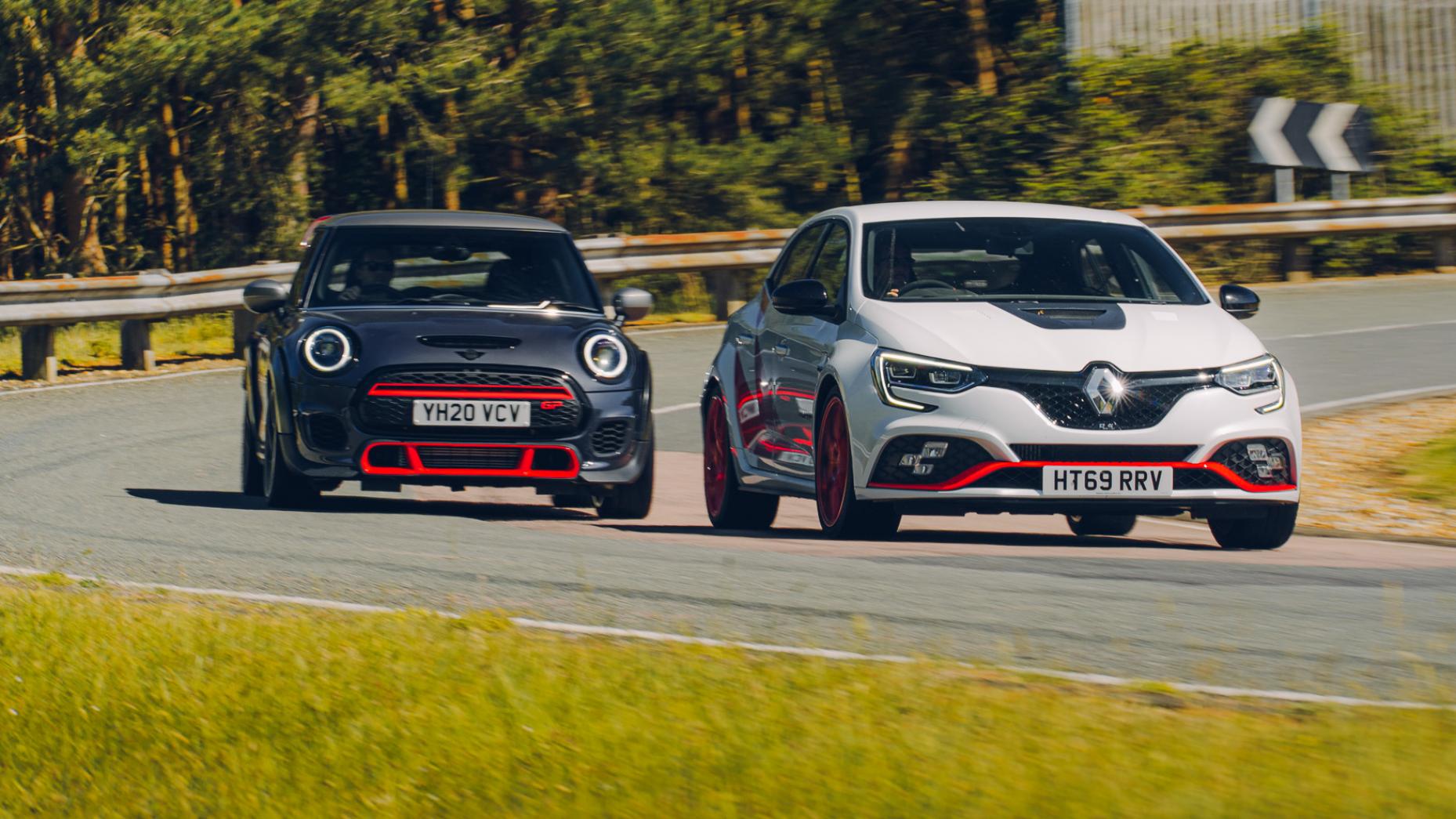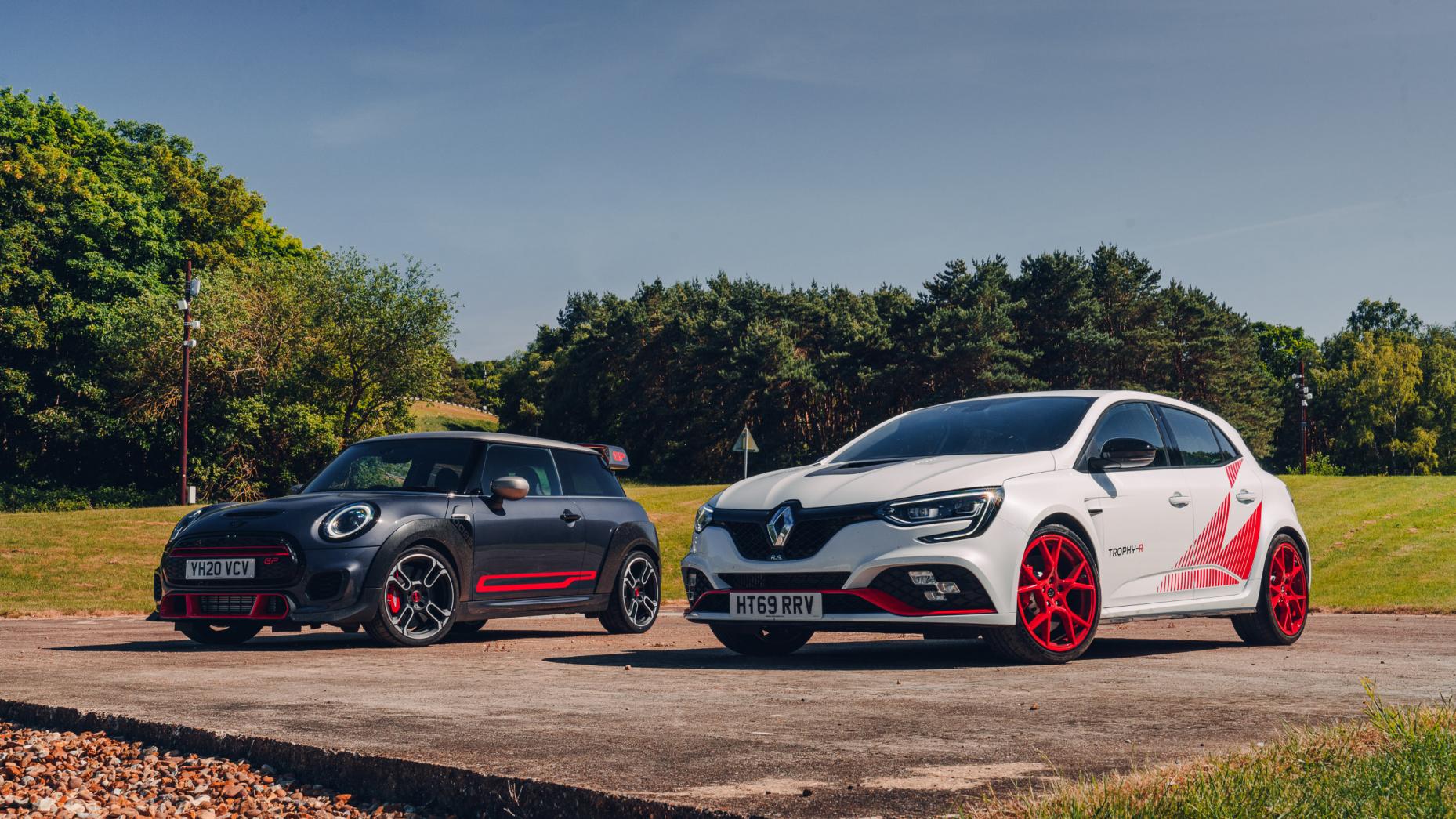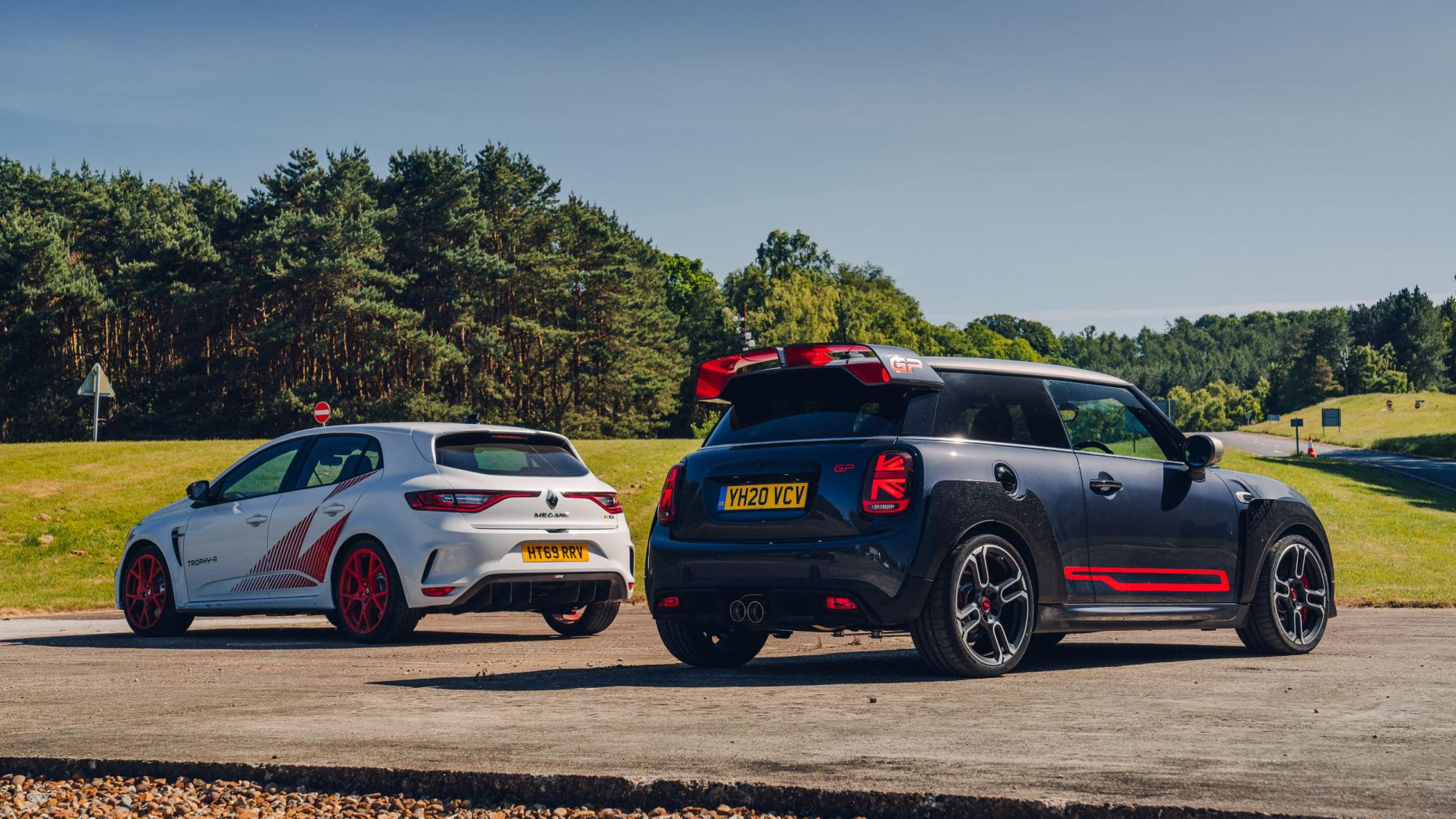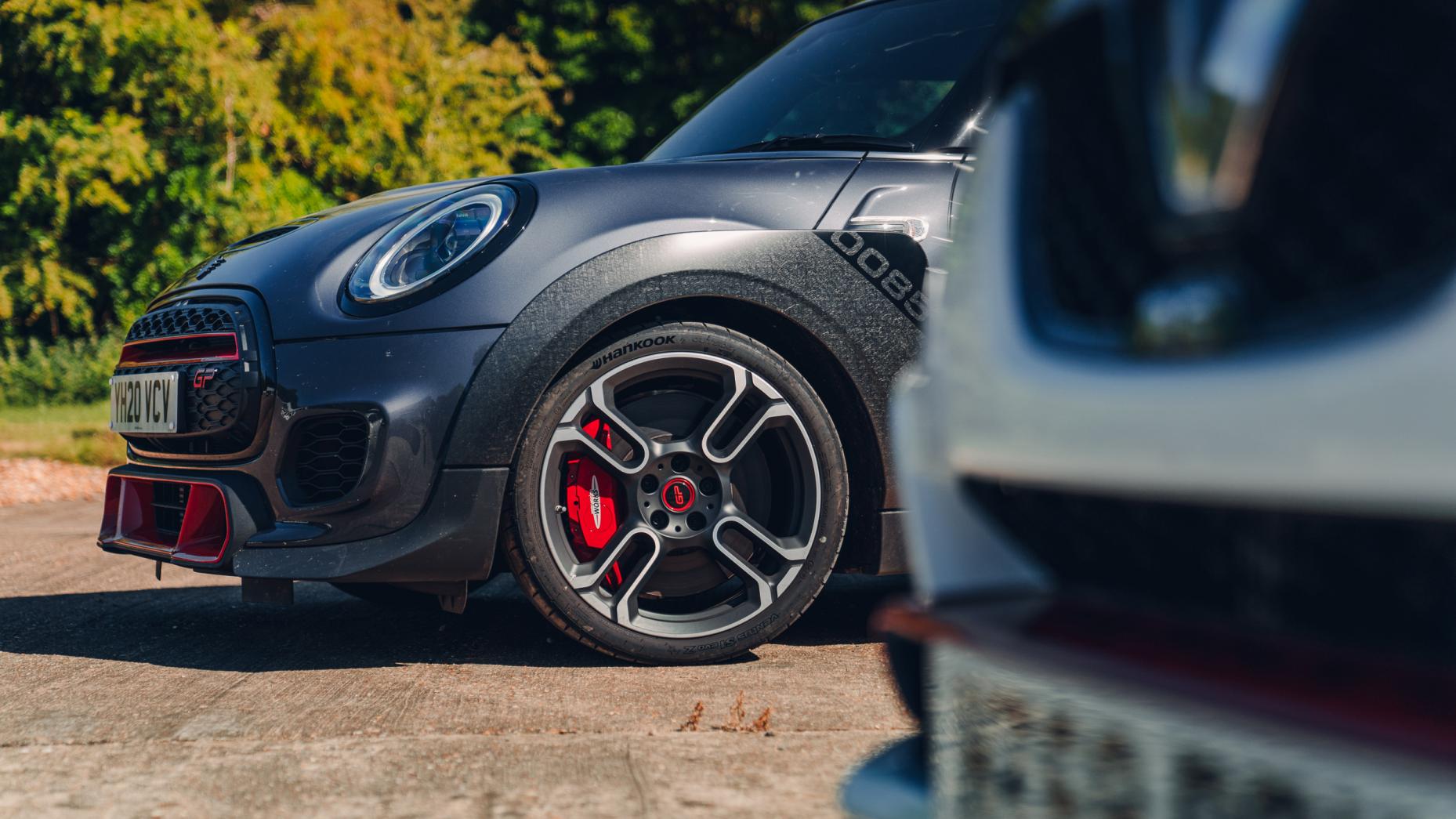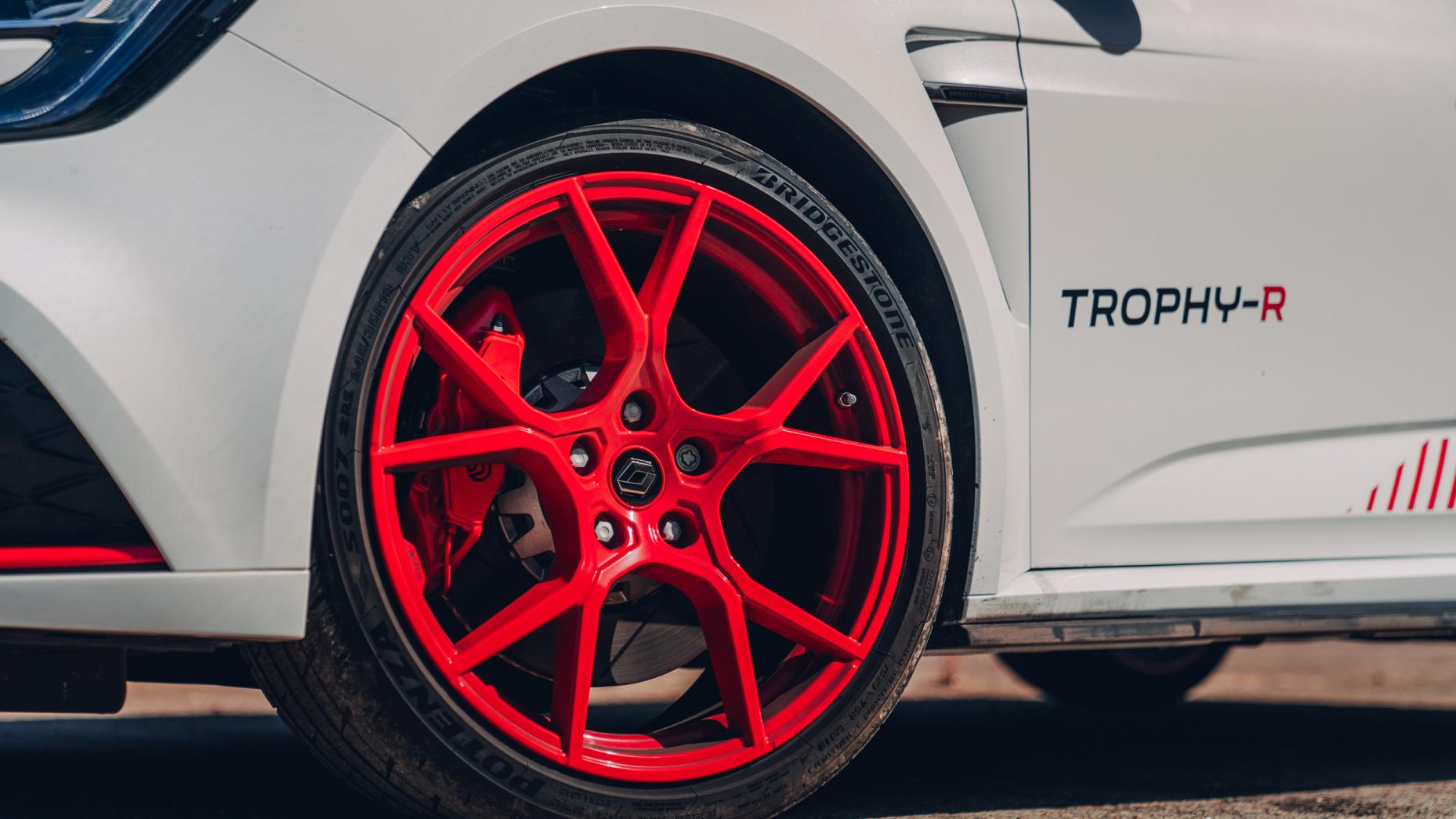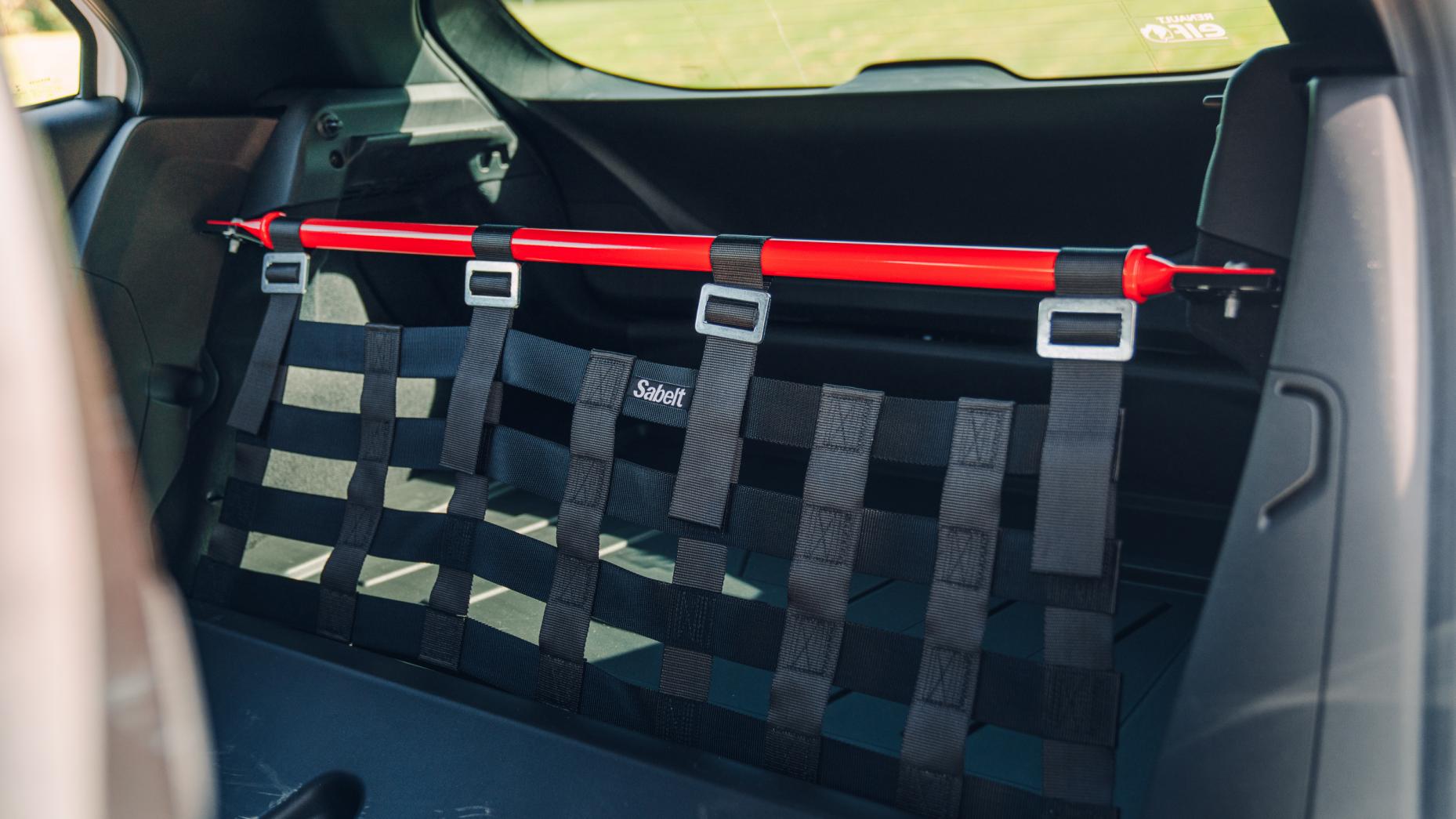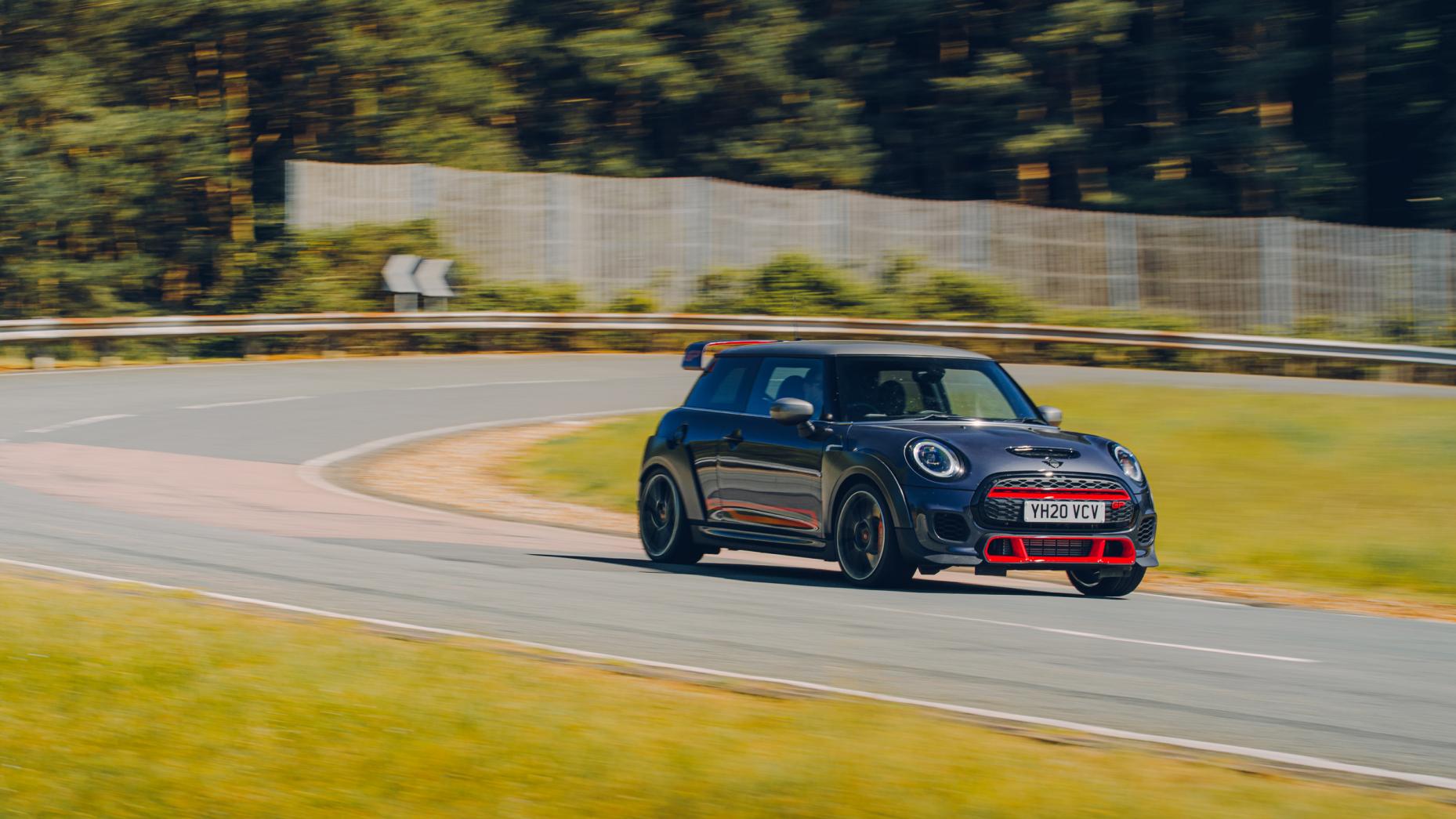Twin test: Mini JCW GP vs Renault Megane RS Trophy-R
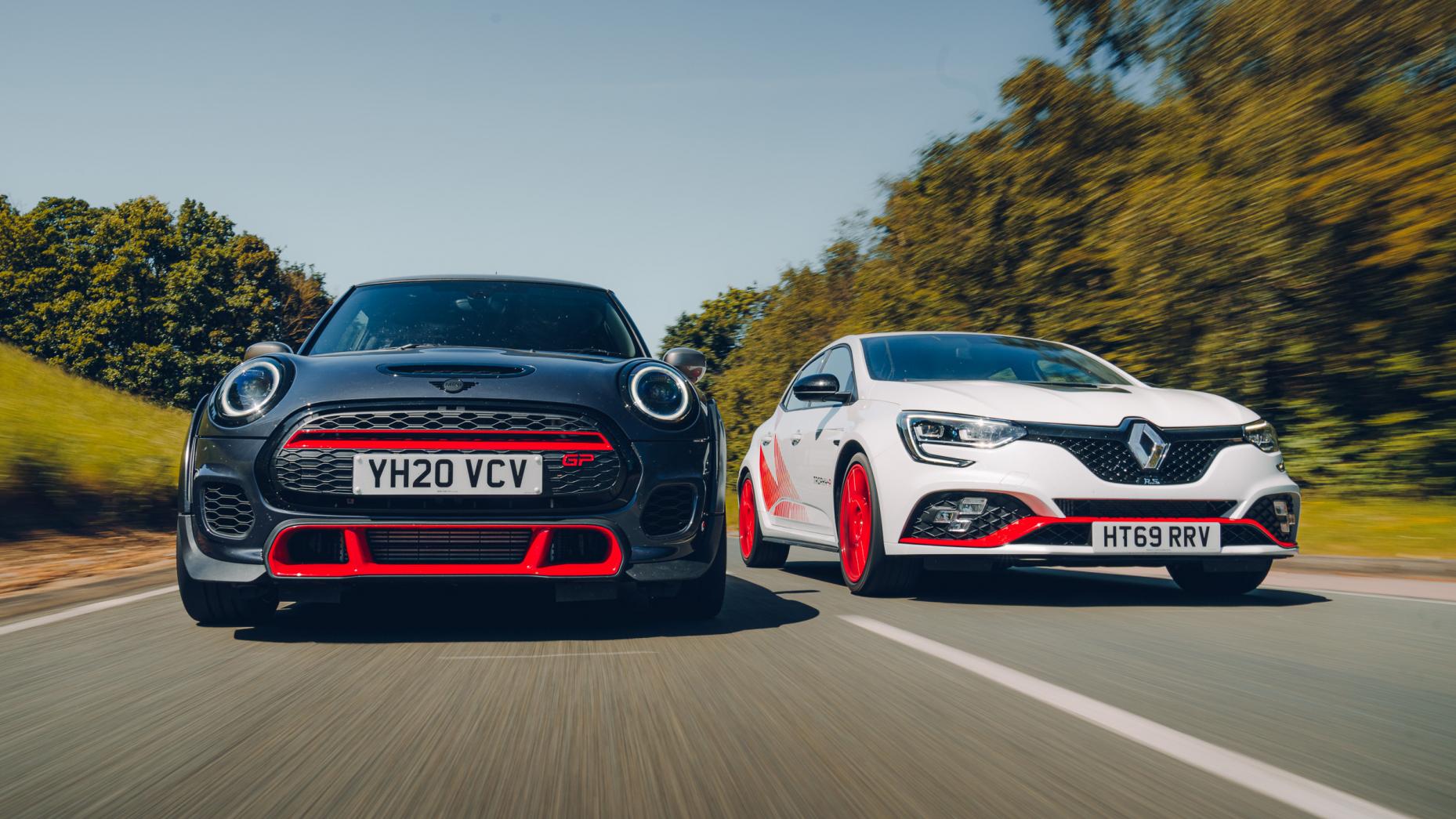
Three doors, two seats, a metal bar across the boot, and lots of power going through the front wheels. The fastest Mini ever made copies the masterplan of its ‘GP’ ancestors. It’s just that the numbers are bigger. More power, more speed, but more weight and more money. The new Mini JCW GP costs just shy of £34,000.
Yet only last year, Renault was attempting to justify selling its own two-seat, scaffolding-equipped shopping car with a price tag of twice that. Equip a Renault Megane RS Trophy-R with carbon-fibre wheels and ceramic brakes and you’d be looking at a ginormous £72k bill.
Words: Ollie Kew and Rowan Horncastle
Because the world is baffling, that version sold out more quickly than the ‘standard’ Trophy-R. Renault had a tougher time selling a £50k hot hatchback than it did a £72k version. Go figure.
Still, the Mini GP3 looks a bargain. It’s more powerful: 302bhp plays the Trophy-R’s 296bhp. It’s quicker against the clock: 5.2sec 0-100kph beats 5.4sec.
Yet brimmed with sat-nav, heated seats and automatic climate control – not to mention carbon fibre aero instead of a Panini sticker set to stand out in the McDonald’s drive-thru – it’s almost £20,000 cheaper than the Renault. Match point to the half-German, half-British SuperCooper.
Hold on – Rowan Horncastle has arrived for an argument in said stickered-up Renault…
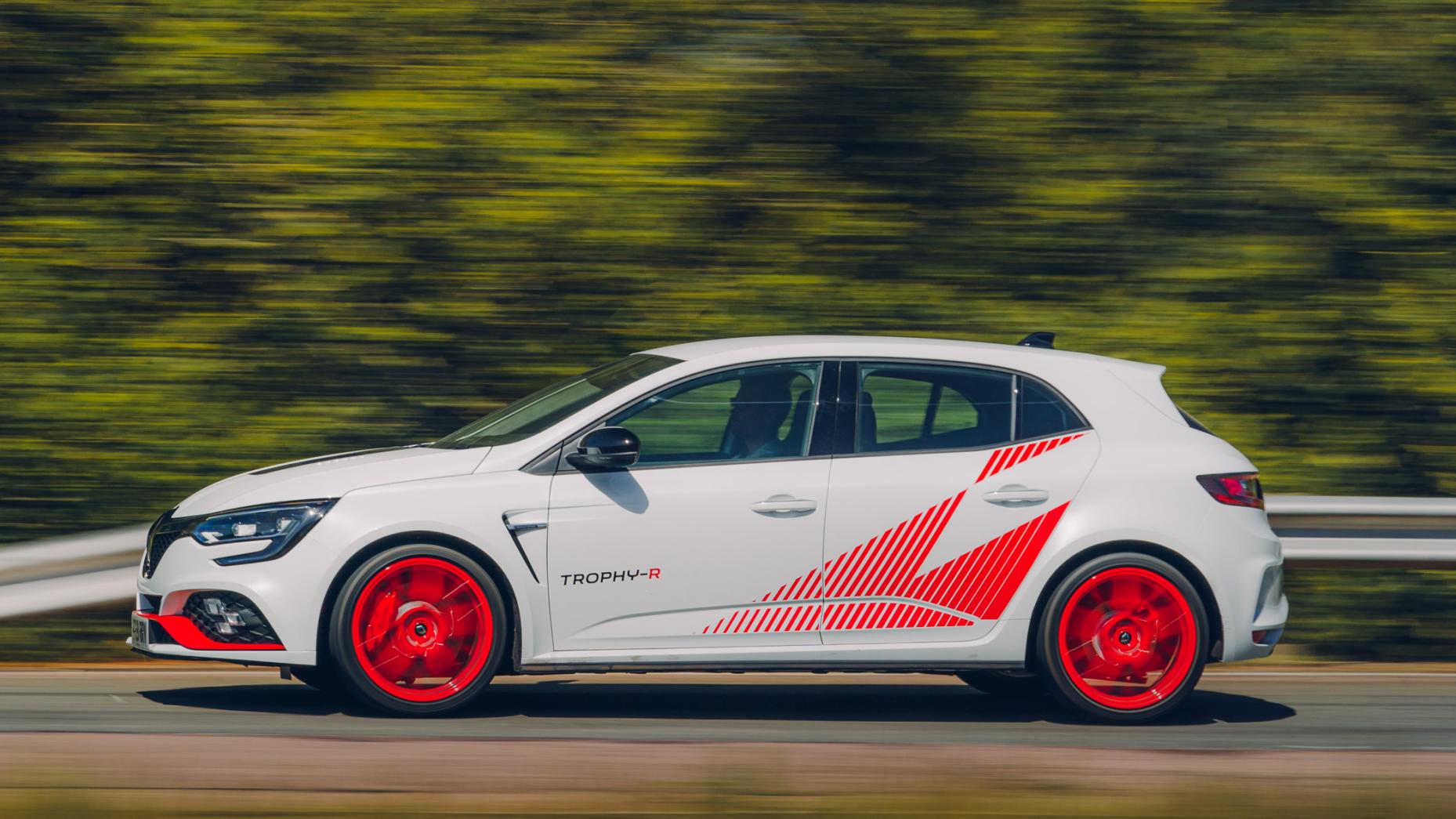
RH: Surprise! Sorry, I just thought I’d jump out of the hedgerows to add some clarity and balance to your ‘hardcore’ hot hatch. Because, as the great philosopher Jack Black once said, ‘You’re not hardcore unless you live hardcore’. And, I’m afraid to say, that Mini GP just doesn’t live hardcore. Aside from binning the rear seats, there’s no compromise to make the thing faster.
Is that aero functional? No. Is that wing functional? No. Is that dog knob coloured strut brace functional? No. Renault’s engineers’ sides must be splitting. The Trophy-R has been militant in its weight saving and performance enhancements. Cut the Megane and it bleeds engineering. I think that Mini may have mistaken ‘engineering’ for ‘confected marketing frippery’.
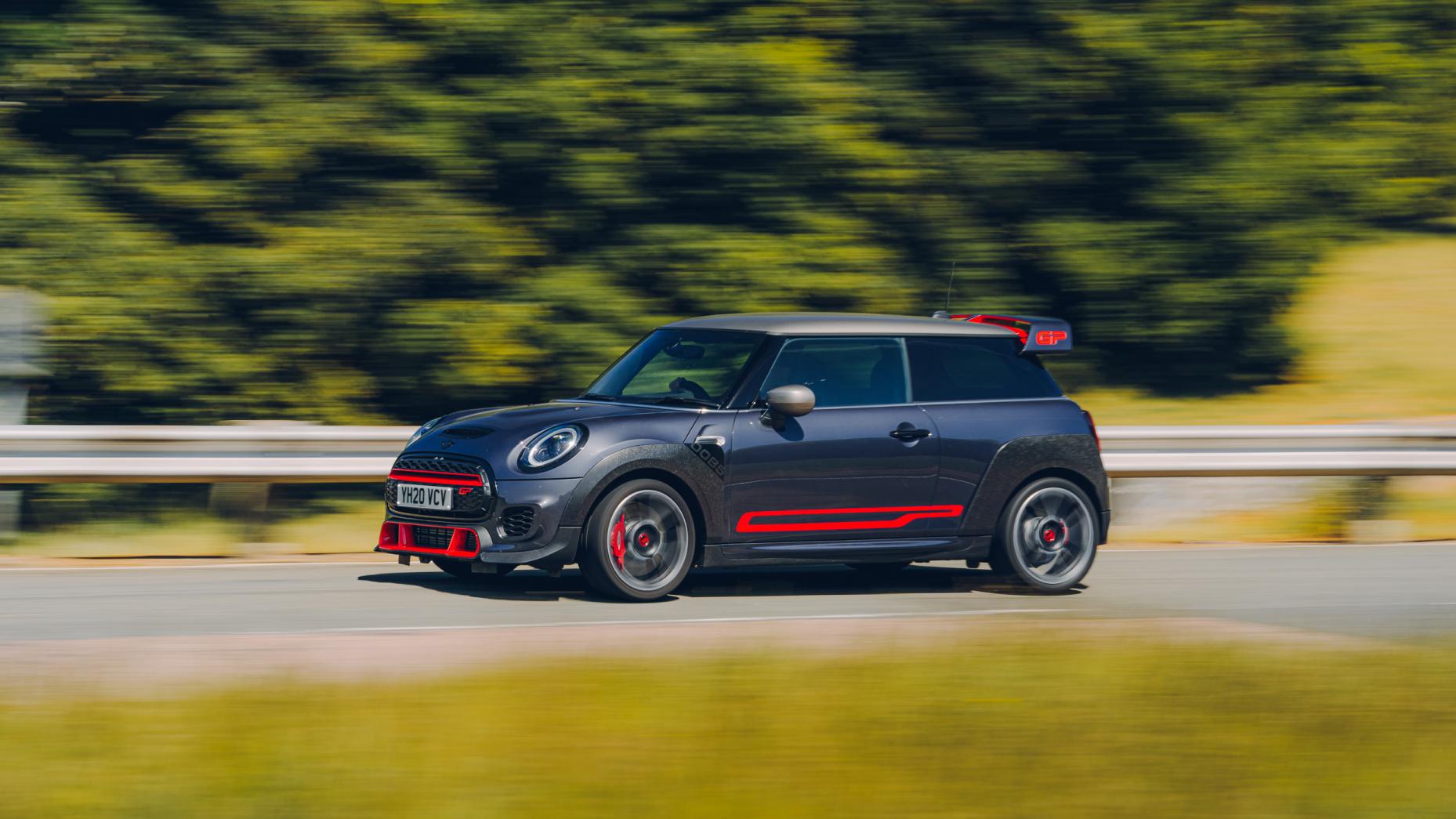
OK: And much as I’m the Mini’s champion here (because for legal reasons I’m the only one allowed to drive it), I agree with almost all of that. But let’s not rewrite history. Every generation of Mini GP has done the token seat-delete and binned the back wiper, but kept its creature comforts and soundproofing. The GP3’s ancestors have both worn winged addenda that had about as much aerodynamic talent as a Lego Millennium Falcon.
So, in the GP3’s defence, it might not be what we at S&M Gear want from a super-hatch, but it’s obviously playing to a crowd that wants a fast car that can have its cake and eat it. Lots of it.
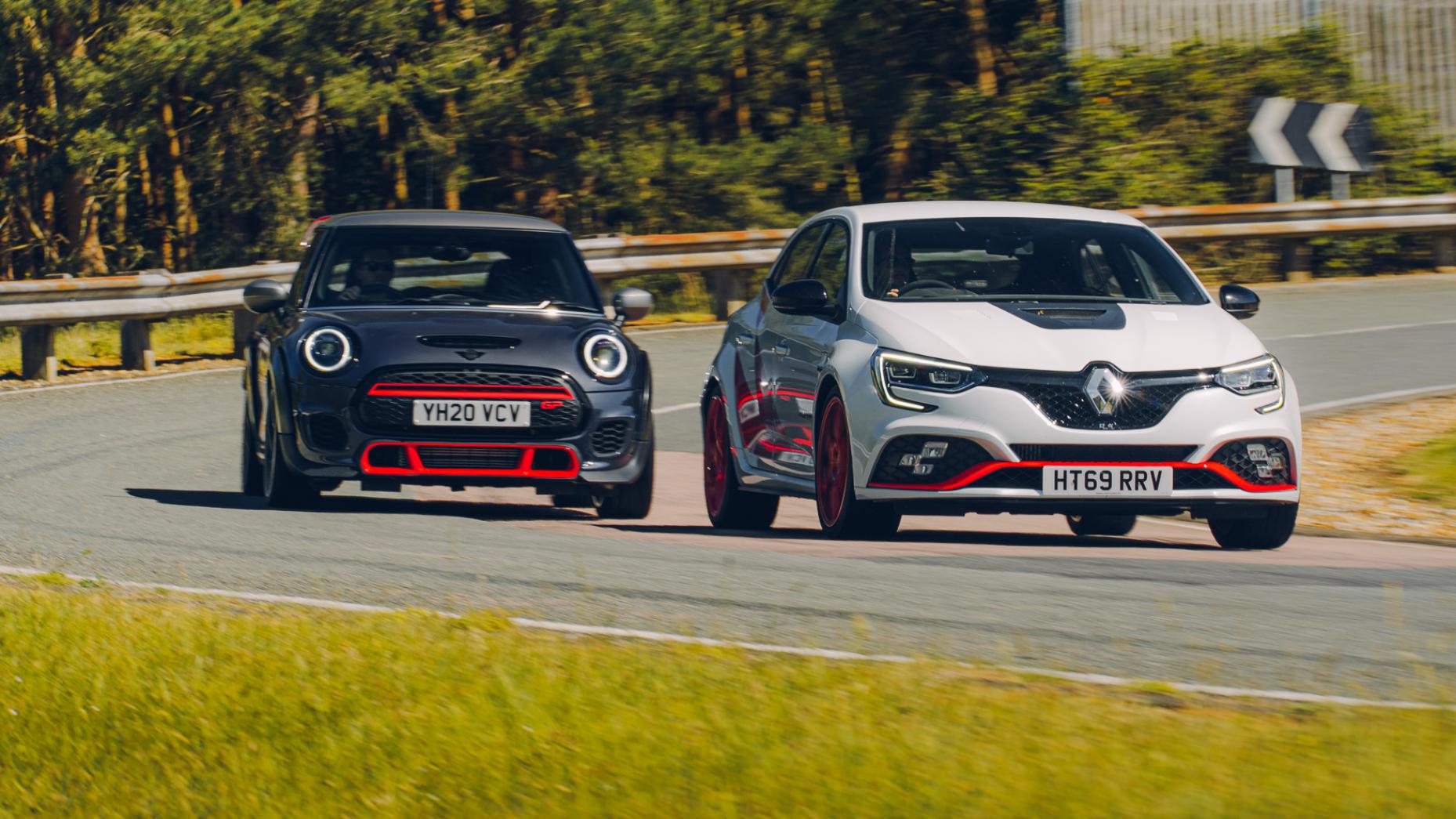
RH: Hold up. Both being in their third generation, let’s rewind the clock back to the first iterations and what they stood for. Their philosophy was to be naked and raw – hatchbacks in their birthday suits. Now the GP has been swept up in what society thinks sporty is: a body confidence influencer decked out Lululemon.
Where’s your substance? The proper ingredients? A manual gearbox, angry diff and motorsport tech like the Megane’s NACA duct hewn into a spookily light carbon composite bonnet. Thankfully, the Trophy-R retains the anorexic diet that was celebrated by emaciated celebs like Paris Hilton back in 2008 when the R26.R was released. In fact, it’s actually lost more weight from its standard car (130kg). It’s true to its principles, just with added usability and speed for 2020.
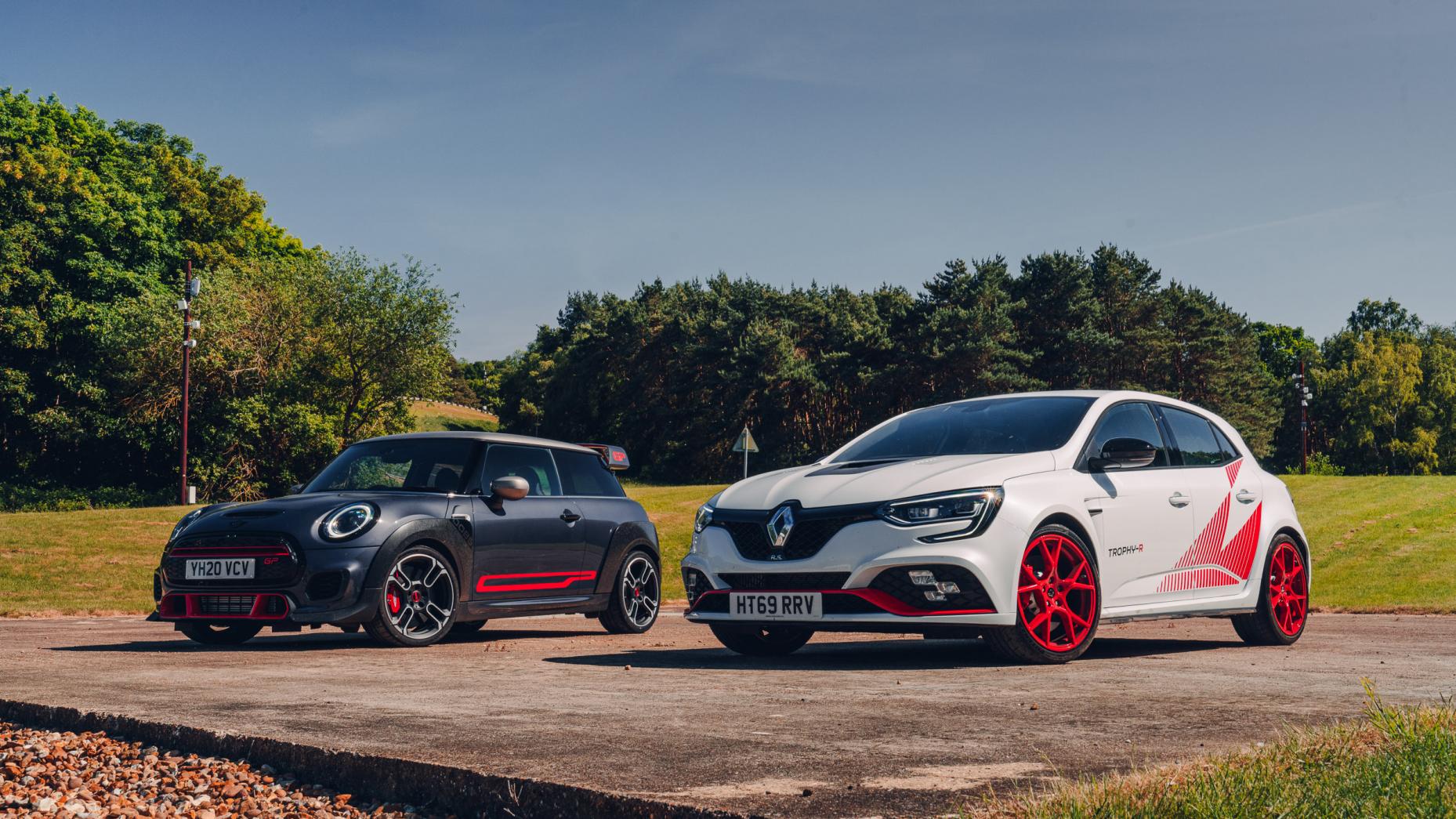
OK: There you have it then – the Mini is a product of its time. The GP3 weighs as much as a Fiesta ST for the same reason that you can’t buy a Lotus Elise with windy-down windows any more. The car industry thinks – with a few rare exceptions – that we’ve all gone soft. Don’t forget, Renault had to flog some R26.Rs at knock-down rates in the end because it couldn’t even sell its entire GT3 RS-spec special’s allocation to us hot hatch-mad Brits.
Thanks to YouTube drag races and Instagram stories, the new currency of what makes a car desirable, for most people, is big power numbers and small 0-60 times. And on that front, the GP3 is undeniably a weapon. This thing’s a rocket-launcher alright, it’s just had the safety catch left on.
RH: Poppy cock! Chasing you around the lanes I know I was a) more involved and b) having more fun. Having to juggle the physical controls, the weight and rotation, the diff and tyres to all work together to gnaw as much traction out of the road is thrilling driving. It’s exciting and immersive. The antithesis of autonomy. I worry that the Mini has taken the successful but soul-destroying blueprint of the Audi RS3 (that of point-and-squirt performance engineering to deliver easy and repeatable low numbers regardless of skill) and run with it. Then stuck some silly carbon offcuts on the side for good measure.
OK: Woah there, don’t go mounting your high horse when it comes to good taste. I may very well be driving an F1 car / vintage pram lovechild, but your car looks like it matches the intended owner’s racing boots. Yuk. And I’m still twenty grand better off.
Anyway, I’m interested: does that thing feel any different when it’s been stripped of its headline grabbing flyweight wheels and race-spec brakes? And if not, what was the bloody point?
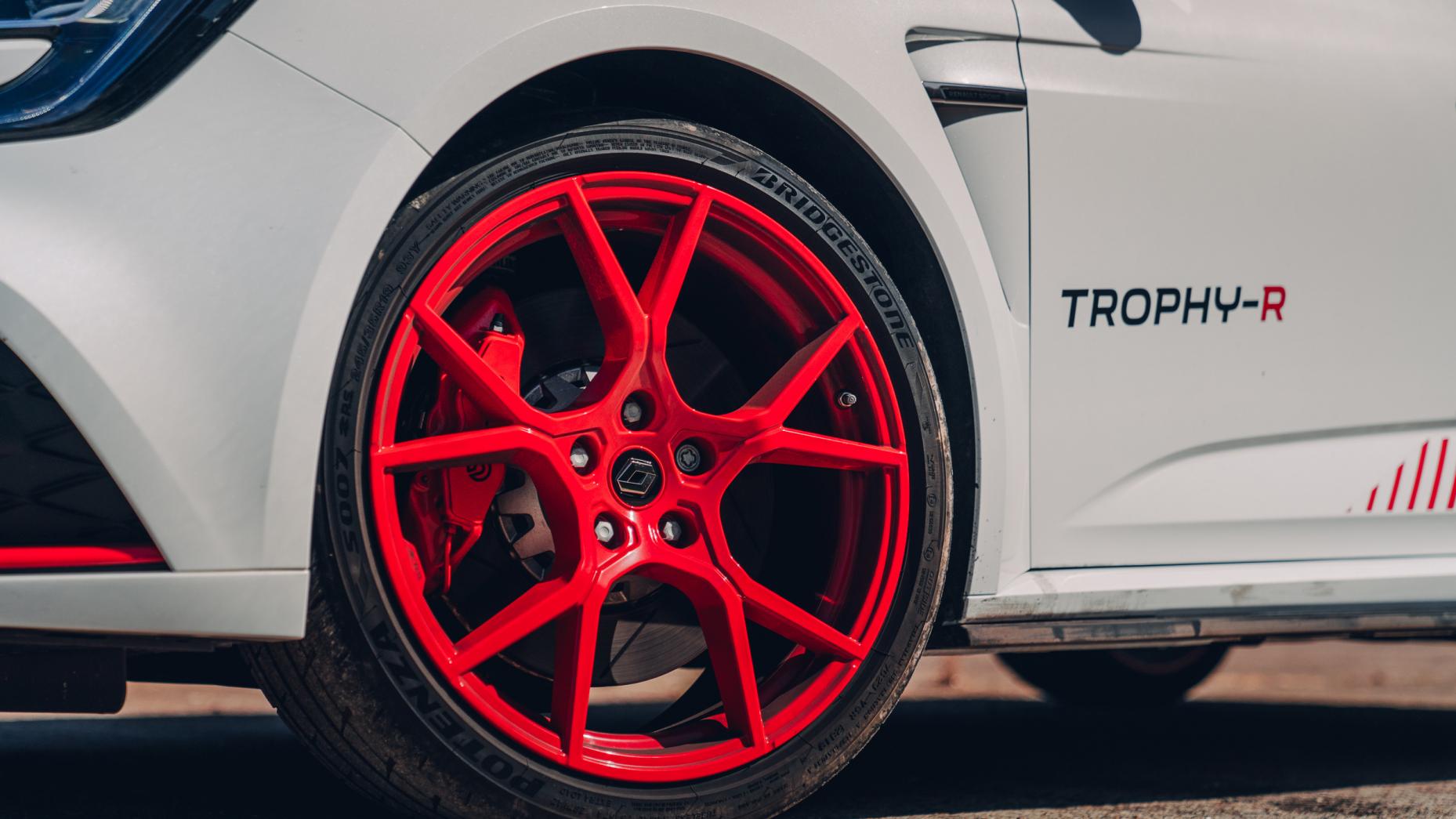
RH: You’re right. With the carbon wheels costing £12k, and the carbon-ceramic brakes another £9k on top of that, they did grab headlines. And people (mainly sat in Recaro seats on casters logged into forums) were outraged at the price. Pure artifice, they thought. But it’ll be very rare if you ever see one in £72k spec. The carbon brakes are unique to the Nürburgring Pack, of which two came in the UK, one being Renault’s press car. So there’s only one in the hands of the public; probably locked in a collection. The carbon wheels were available for about half the UK allocation of 32 cars, so no more than a baker’s dozen will be on those. But would you miss these big-ticket items? Yes and no.
The sheer power of the ceramic Brembo brakes is astonishing. The way you have to rewire your brain and modulate them to brake later and later and later is an addictive game in itself. There’s just so much force stopping force to play with; it is genuine race car stopping power shock in a shopping trolley. But on the road, you wouldn’t use them like that. So they’re made for track… where you’d be terrified of ruining them in the gravel trap when you get too cocky. Which would definitely happen.
Same story for the wheels. Can you feel the 18kg combined weight saving of them and the brakes on the road? A bit. But what you can feel is the weight of anxiety off your shoulders (probably more than 18kg worth) that is lost from not having super posh, near impossible to repair wheels. It means you can attack corners a bit more on a B-road, not wince at a pothole and let that rear-axle dance so you can go for the occasional corner cut. Plus, red wheels suit the Megane as a homage to its R26.R grandad. They just look ‘right’.
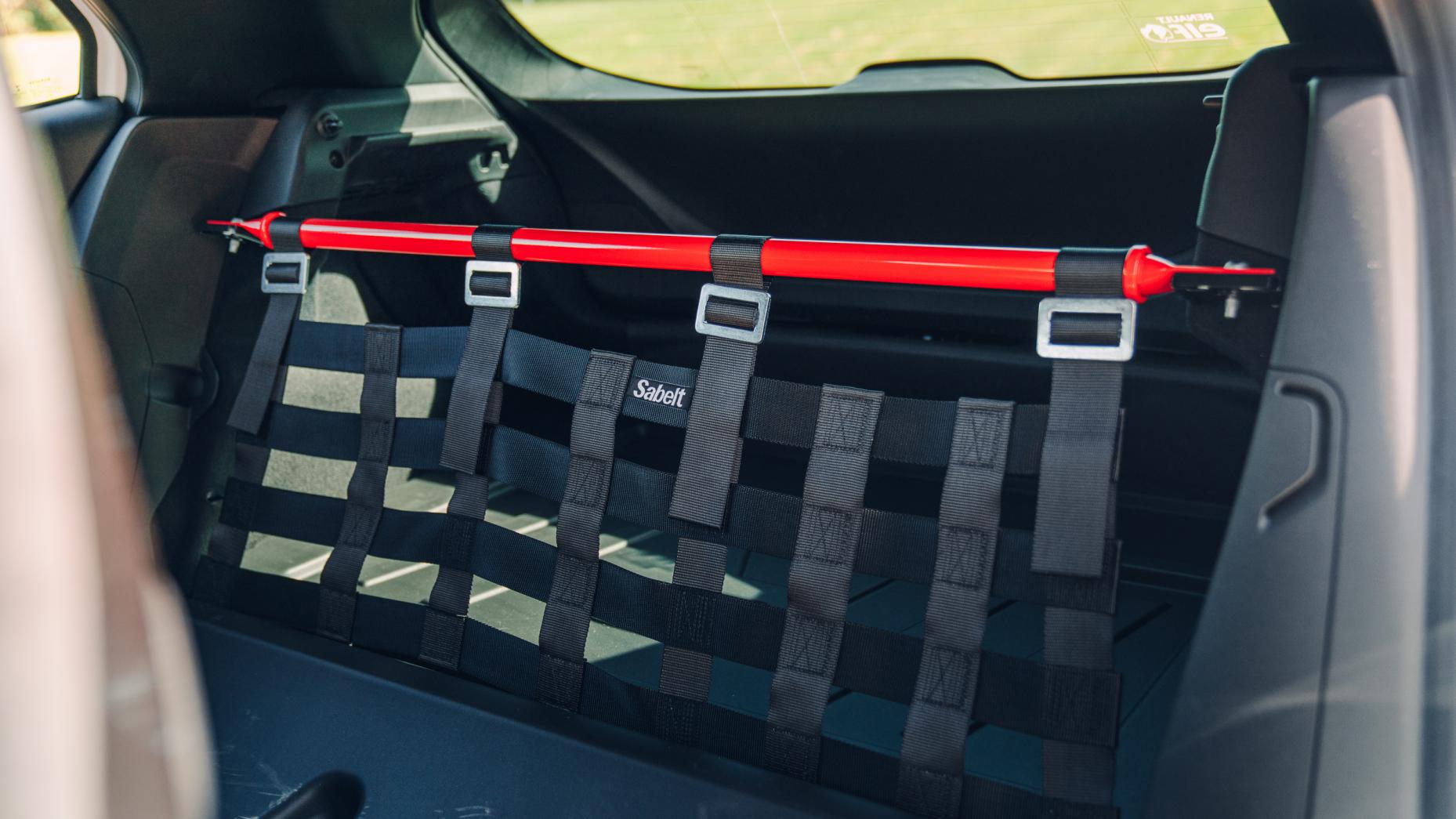
OK: Hope the Megan-thusaist who shelled out for the £72k version isn’t reading this.
RH: Before I stuff your head up those ridiculous oversized-exhausts, let’s talk drivetrains. I know the Trophy’s 1.8-litre turbo four isn’t the most exciting thing in the world, and Renault’s six-speed manual is like navigating an oar through a bucket of marbles, but surely you can agree they’re better than that 135i engine through an auto? Actually, isn’t that Mini GP just a Foxton’s Graduate of the Year’s BMW 135i in drag?
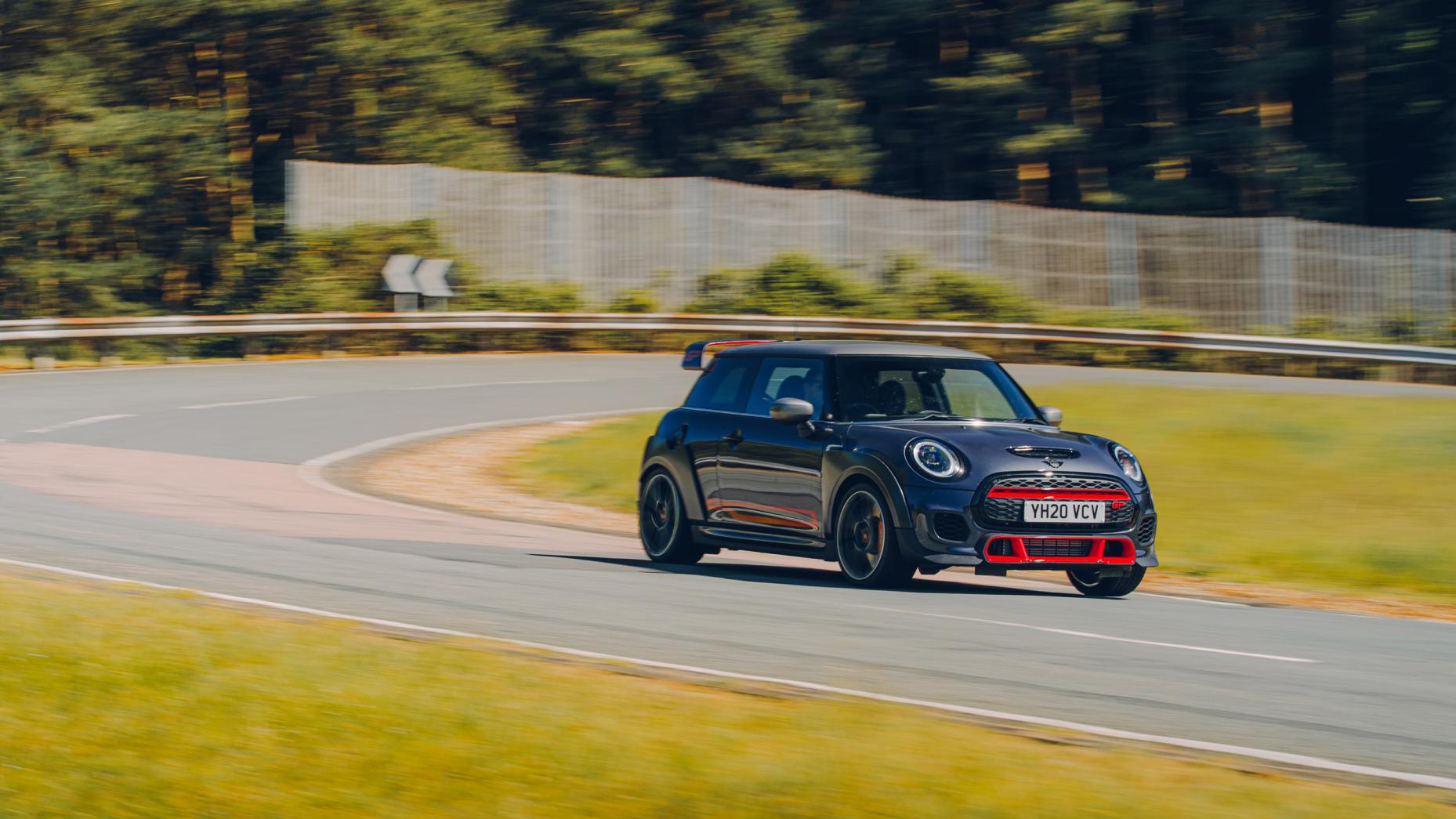
OK: Damn, hoped you wouldn’t bring that up. Yes, this is basically an M135i powertrain minus its rear driveshafts. And it’s an own-goal by Mini.
There’s no doubting the GP’s pure speed – 302bhp and 450Nm in a Little Tykes Cozy Coupe is always going to be rapid. In-gear, it’s a demon. It wastes nothing – the anticipation builds until you’re through the lag at 3,000rpm, then it just teleports away. But the engine Mini’s used is the flattest-sounding, most characterless motor ever stuck in a super-hatch. It just buzzes away while the incongruous auto ‘box whisks through the shifts hoping you won’t even notice it, like a butler. Until whoops – you’ve crashed into the killjoy 6,000rpm limiter. It should’ve been a 250bhp manual with the AK47-spec exhaust off the Cooper S 210 Works. But I guess emissions laws said nope.
I get why this engine-gearbox combo would work in say, a Clubman estate or a Countryman crossover, or even in BMW’s grown-up hot hatch. But in a lil’ Cooper – and the hardcore, run-out special at that – it needed more revs, more energy, and more pedals in the footwell.
I respect the Mini’s sheer performance, and how much more professional it is over a standard JCW. Its cornering speeds, traction and damping are all top-drawer. The brakes are mighty. It changes direction like it’s following a Scalextric groove in the road.
You know what? It’s the McLaren MP4-12C of hot hatches. Mathematically stupendous, at the expense of a sense of humour. Using it to chase your Megane made me grimace with G-force, not giggle with mirth. Ugh, I hate losing. Especially to the French.
